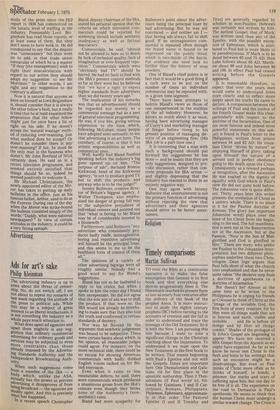Ads for art's sake
Philip Kleinman
The advertising industry is up in arms about the threat of censorship. No, do not switch off; I am not about to repeat my remarks of last week regarding the attitude of the press to political ads. While this may be a subject of great interest to us liberal intellectuals, it is not something the industry as a Whole pays much attention to.
What does upset ad agencies and upset them mightily is any suggestion that ordinary commercial advertising for ordinary goods and services may be subjected to even more constraints than those already imposed by the Advertising Standards Authority and the Independent Broadcasting Authority.
When such suggestions come from a member of the IBA — a body which, unlike the ASA, actually has the power to prevent ad.vertising it disapproves of from being broadcast — the agencies are doubly upset. And this is precisely What has happened.
In a recent speech Christopher Bland, deputy chairman of the IBA, stated his personal opinion that the criteria on which television commercials could be rejected for screening should include aesthetic inadequacy as well as factual inaccuracy.
Commercials, he said, "should not be allowed to bore us to death by lack of technical quality, lack of imagination or over-frequent repetition." Commercials which were "obviously bad TV" should be barred. He had no fault to find with the IBA's present control methods as far as they went but he believed that "we have a right to expect higher standards from advertisers than we did twenty years ago." The implication of his remarks was that an advertisement should be regarded not merely as a commercial message but as a part of general television programming. He was, if you like, giving serious expression to the view which, following McLuhan, many people have adopted semi-seriously, to wit that advertising is an art form. The corollary, of course, is that it has artistic responsibilities as well as commercial ones. Well, hardly had Bland finished speaking before the industry's big guns opened up on him. "The purpose of ads", declared Ronnie Kirkwood, head of the Kirkwood agency, "is not to produce good TV but to shift the products, and anyway who is to be the judge?" Jeremy Bullmore, creative director of Britain's biggest agency, J. Walter Thompson, also emphasised the danger of giving full rein to the subjective prejudices of individual censors and pointed out that "what is boring to Mr Bland may be of considerable interest to a housewife."
Furthermore, said i3ullmore,"any advertiser who consistently produces badly made, unimaginative, boring and repetitive advertising will himself be the principal loser, and this seems to me to be the healthiest form of control of them all."
The opinions of a variety of other advertising bigwigs were all roughly similar. Nobody had a good word to say for Bland's suggestions. Bland has not so far bothered to reply to his critics, but when I • spoke to him the other day I found him unrepentant. He did not agree that the sole aim of ads was to shift the product. If that were so, the IBA would not already be interfering to make sure that they also told the truth and conformed to certain standards of decency.
Nor was he floored by the argument that aesthetic judgement was bound to be subjective. There were certain basics about which, in his opinion, all reasonable judges could agree. For instance, on the more technical side, there could be no excuse for showing American commercials with badly dubbed English voices tacked on for British television.
Even when it came to less measurable defects, he said, there were commercials which produced a unanimous groan from the IBA's censors even though they broke none of the Authority's (nonaesthetic) rules.
Bland had more sympathy for Bullmore's point about the advertisers being the principal loser by bad advertising. But he was not convinced — and neither am I — that boring ads always fail to shift good. If an unimaginative commercial is repeated often enough the brand name is bound to be impressed on the public mind, which is two-thirds of the battle. For evidence one need look no further than the history of soap powders.
One of Bland's chief points is in fact that it would be a good thing if a curb were to be put on the number of times an individual commercial may be repeated within a given time segment.
There have been attempts to belittle Bland's views as those of one inexperienced in the realities of the ad industry. However, he knows as much about it as most, having been advertising manager of Curry's and marketing manager of Singer before rising to his present position of managing director of an engineering firm. (His IBA job is a part-time one.) It is interesting that a man with such a background should put forward the suggestions he has done — and he insists that they are only suggestions, designed to provoke discussion, rather than concrete proposals for IBA action — and slightly depressing that the industry has reacted to them in an 'entirely negative way.
One may agree with Jeremy Bullmore that entertainment is not the primary function of advertising without rejecting the view that advertisers and their agencies should strive to be better entertainers.


































 Previous page
Previous page